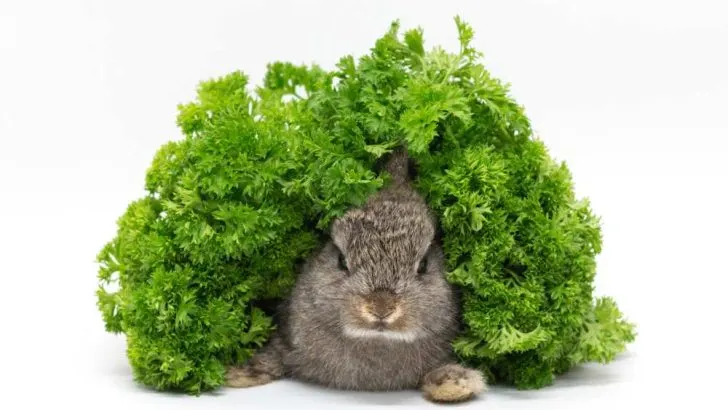Leafy, fresh greens – children hate them, but rabbits undoubtedly adore ’em! Not only that rabbits love the green stuff, but it’s also even a part of their regular diet. Fresh, green herbs are a great addition to a rabbit’s daily meal.
However, not all greens are good for them. There are loads of green herbs out there. We love greens as salads and next to our steaks.
But, choosing the right greens for our vegetarian pets can be a tough decision. You really want to avoid upsetting their sensitive stomachs. So to keep your bunny safe, we decided to ask the question – can rabbits eat parsley?
We plan on figuring that out. In this complete guide, we’re covering all the basic stuff you need to know about parsley consumption in rabbits! How much parsley is too much for your pet, are there some health benefits, and can they eat the whole thing?
Read along to find out!
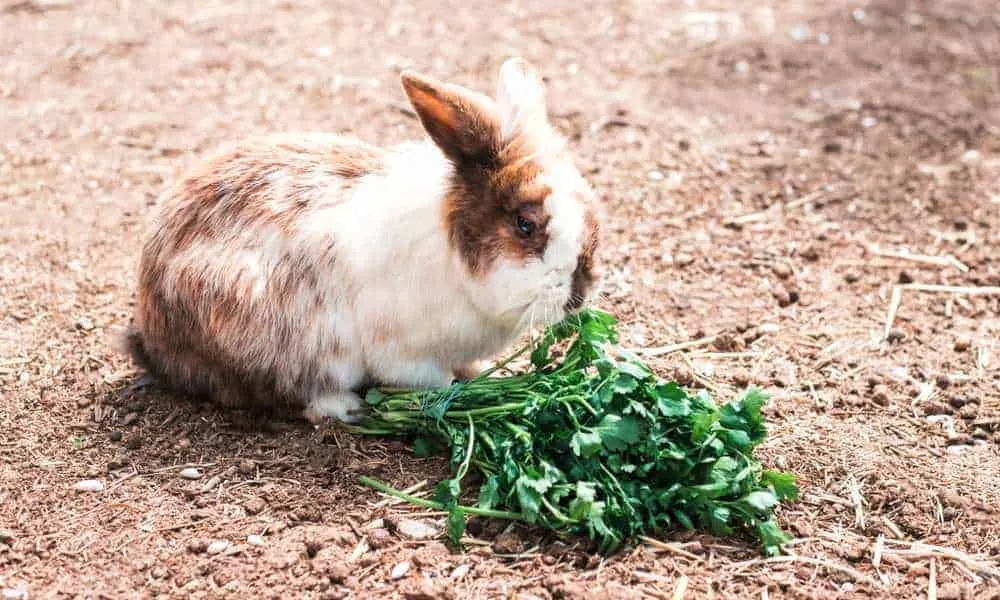
Can Rabbits Eat Parsley?
To ease the uncertainty – rabbits can eat parsley! Not only can they eat parsley, but they also enjoy it very much! Plus, this green herb even comes with a few health benefits, but more on that later.
Parsley is entirely safe for rabbit consumption. And yes, that refers to every part of the plant. This is why this green herb is a perfect addition to your rabbit’s diet. As a matter of fact, rabbits love to chew on the parsley leaves and roots.
Parsley is a plant native to the Medditerian. The two most common types are the Italian flat-leaf and the french curly leaf. Both types are perfectly suitable for your rabbit. Through the years, humans have used parsley to treat numerous conditions like high blood pressure or allergies.
This Medditerain herb is well-known among humans as a disease-fighting plant. However, whether you’re an experienced rabbit owner or not, you know that a rabbit’s diet should consist mainly of hay and freshwater!
Herbs and vegetables should take up to 10 percent of your rabbit’s diet. Parsley is no exception to that rule! So, no matter how much we’re going to praise parsley in this article, keep a balanced diet in mind!
Regardless of all the things that parsley can provide to your bunny, hay should still be a central part of their meals. The fiber in hay is necessary for your rabbit. It promotes regular digestion and even prevention of hairballs from forming in their stomach.
Without a hay-centered diet, your rabbit is exposed to various health risks. Because of their complex digestive system, rabbits are prone to gastrointestinal stasis, better known as blockage.
If a rabbit doesn’t eat enough hay, that can slow down its intestinal functions, leading to that disease. The blockage is no joke, and sometimes it can even lead to death. Besides gastrointestinal stasis, hay consumption is also essential because of their constantly growing teeth.
Now that we got that out of the way, we can focus on the positive stuff! Before heading to the health benefits, it’s best to look at the nutritional value of parsley. Here’s the nutritional value of 100 grams of parsley.
| Calories | 36 |
| Total fat | 0.8 grams |
| Sodium | 56 milligrams |
| Potassium | 554 milligrams |
| Carbohydrate | 6 grams |
| Protein | 3 grams |
Well, you can be sure that your bunny doesn’t have a risk of obesity with this one! No wonder parsley is considered a superfood. Because it’s so high in fiber but low in sugar and fat – parsley is one of the best options to add to your pets’ bland meals.
Other than the information listed in the table, parsley is rich in antioxidants and other nutrients. In fact, parsley is among the herbs with the highest Vitamin C count! It even has more iron than spinach. Plus, parsley is filled with Vitamin K and A!
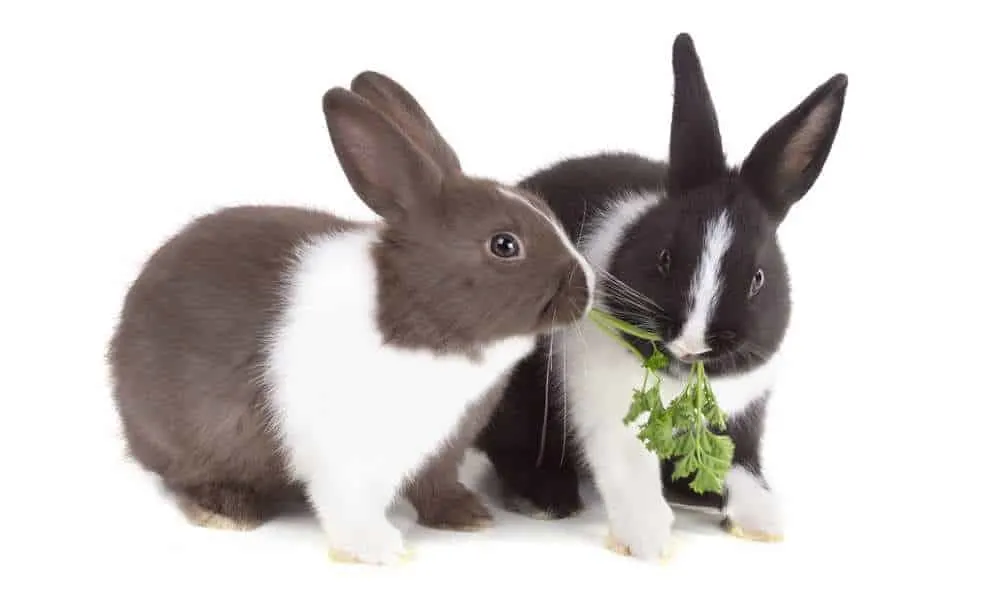
Health Benefits
We can imagine that mere numbers and listings of vitamins don’t mean much to you, nor to your rabbit. No worries, we’re about to explain everything! As we stated before, parsley provides lots of benefits to your pet.
For starters, the antioxidants in parsley prevent cellular damage from free radicals. The primary antioxidants in this green herb are carotenoids, flavonoids, and vitamin C. Vitamin C is a great immunity booster. Besides that, it helps your rabbit fight off chronic diseases.
Those antioxidants in parsley do a great job at reducing heart disease. Additionally, parsley reduces high blood pressure, which is also a risk for kidney disease. Due to those antioxidants, parsley even has anti-inflammatory properties!
Vitamin A, with the help of carotenoids in parsley, supports your rabbit’s eyesight. On the other hand, Vitamin K is an essential nutrient for bone health. It helps you and your rabbit build stronger bones. Vitamin K also provides healthy blood.
Can Parsley Be Bad For Rabbits?
Although all of these benefits sound amazing, remember that moderation is essential. Except for hay, no food is good for your rabbit when it’s given in excess. The benefits quickly get canceled out, and you’re left with an imbalanced diet. That is usually followed up with an unhealthy rabbit.
The good sides can even turn bad. The minerals and vitamins in this superfood can, in large quantities, upset your rabbit’s digestive system. An excessive amount of parsley can lead to gas or an upset stomach.
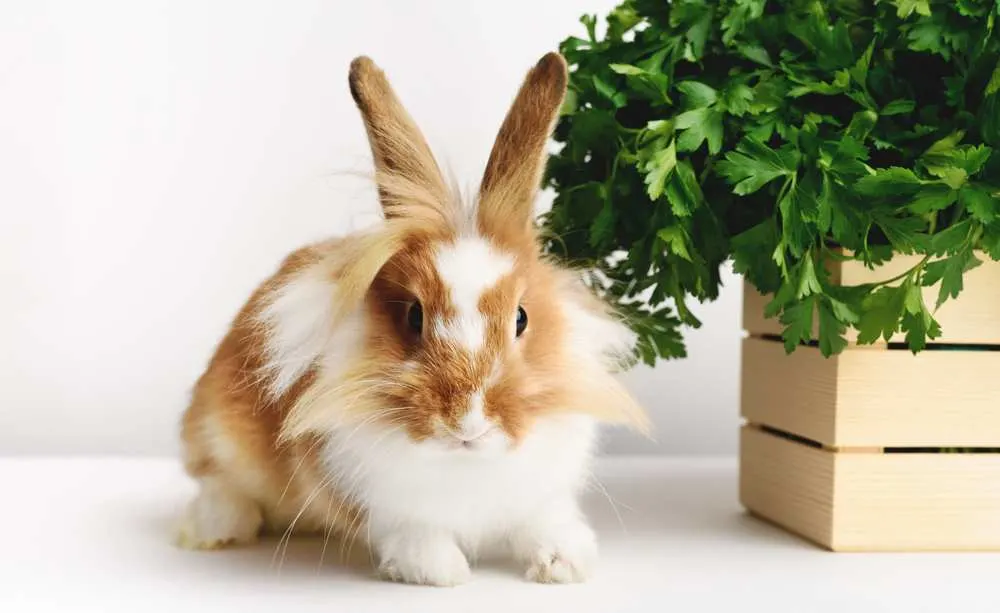
Introducing Parsley
All food should be introduced slowly into your rabbit’s diet. Because of their complex digestive system and their easily disturbed gut bacteria, slower is always better. When giving your pet parsley for the first time, try giving him a single spring.
After that, monitor his reaction. If everything is okay, you can gradually add more parsley until his digestive system is adapted completely. Instead of using dried parsley, give him fresh, whole sprigs for them to enjoy most of the health benefits that parsley provides.
IMPORTANT NOTICE: When giving your pet rabbit fresh parsley, make sure that it’s thoroughly washed! Many pathogenic bacteria can be found on parsley branches, then can cause potential health issues to your rabbit.
Washing parsley is essential when you’re giving your rabbit the store-bought version. Some commercial parsley types are sprayed with pesticides and other chemicals, which can harm your bunny pal.
How Much Parsley Is Okay?
When your rabbit is fully adapted to parsley, you can serve it fresh by itself. One or two leafy stems are more than enough for an adult rabbit. You can also chop up the leaves and add them to your rabbit’s vegetable salad.
Don’t give baby rabbits parsley. It can be too strong for the little fella! According to veterinary experts, rabbit owners should wait until their bunny is six months old to give them parsley. This is only if the babies don’t suffer from digestion issues.
Parsley Roots
As we mentioned in the beginning, every part of parsley is safe for your furry pal. However, parsley roots shouldn’t be given so generously. The roots of this herb should be fed to a rabbit as often as any other non-leafy treat.
Like with carrots, zucchini, and bell peppers, a minimal amount from time to time is more than enough. One teaspoon of parsley root for an adult rabbit is okay. It’s just an occasional treat, after all!
Keep in mind, the parsley roots are not bad for rabbits. However, the roots and tops contain a high level of essential oils that can trigger some stomach issues in rabbits. This is why you should give it sparingly!
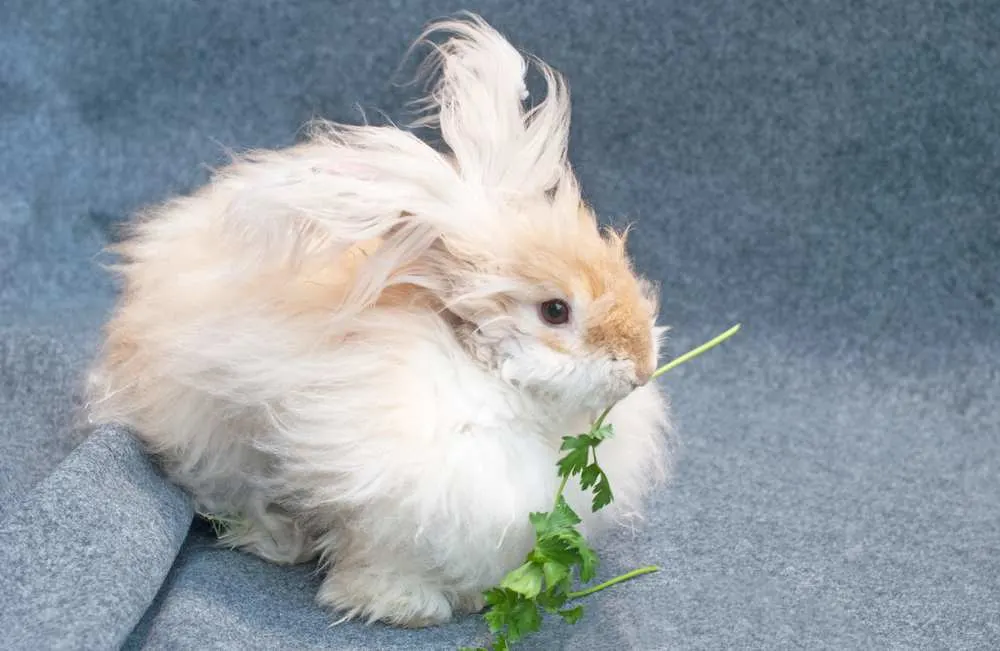
Final Words
You’ve come to an end! To conclude:
Parsley is an excellent herb for your rabbit to snack on. Its nutritional value is superb, and they love the stuff. Parsley can do wonders to your rabbit’s health, but just if it’s given in moderation.
Every part of parsley is suitable for your pet; just make sure that it’s thoroughly washed. Parsley roots can be an occasional treat, but don’t give it as much as you provide the leafy parts. It can cause some discomfort to your furry pal.
Although parsley is a fantastic source of nutrients, it’s not, and it should not be a replacement for hay or grass. Hay should take up to 90 percent of your rabbit’s diet. Everything else, no matter how healthy it is – is just a plus. That refers to parsley, too!
So, without further ado, grab some parsley and let your adult rabbit start munching on the stuff!

